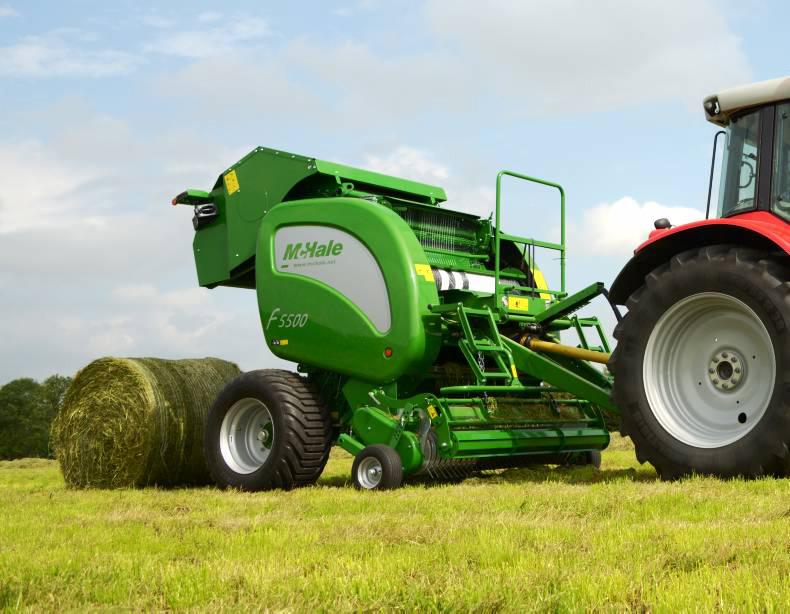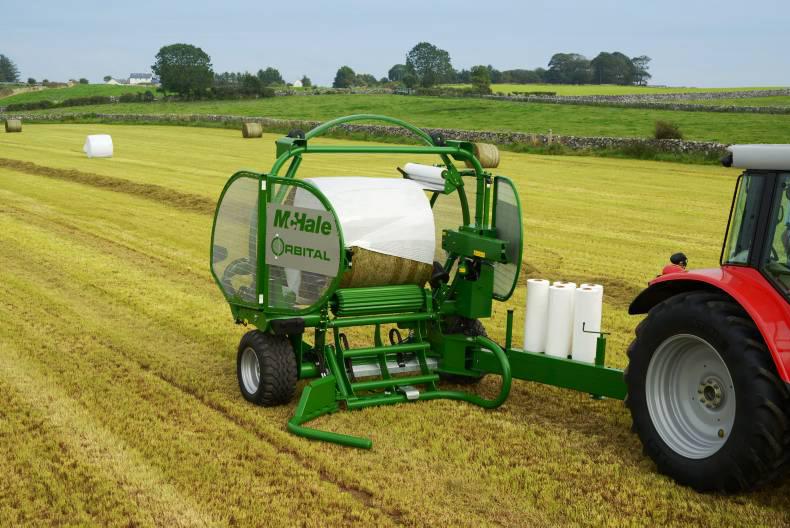"McHale is just a box without its team of people; it is the team at McHale that differentiates it, that makes it a world-class business,” says Paul McHale, marketing manager with agricultural machinery manufacturer McHale. “The team ensures that the products we manufacture are manufactured, tested and delivered on time to our end customers around the world.
“It is also through this team that the ideas for new, unique McHale products like the McHale Fusion are developed,” says Paul. “On the sales side, our people forge strong, long-lasting relationships with our distributors and dealers around the world. A lot of these relationships have started since we entered new countries, and over time our business and the businesses of our importers and dealers have grown.”
Expansion
McHale employs 450 people and is in the process of completing a 200,000 square foot expansion (that’s five acres, roofed) at its main manufacturing and R&D centre in Ballinrobe, Co Mayo.
As a result of business growth and expansion, McHale is recruiting for a large number of jobs and hopes to fill 25 new positions over the next 12 months.
For direct manufacturing roles, McHale will be recruiting for assembly engineers, fitters, mechanical engineers, welders and spray painters. McHale is also recruiting for a HR manager, electronics design engineer, software engineer, market support in Germany, market support in France, R&D engineer, electrical, technical manual publisher/technical writer and service engineers.
It’s no surprise McHale is recruiting for market support in France and Germany, as the company’s specialist range of round balers and round and square bale wrappers are used on farms in more than 50 countries across six continents. Over 90% of McHale’s business is export.
McHale is exhibiting at the Irish Farmers Journal and open eir Agri Careers Fair on 3 March in the RDS, so if you’re interested in working for the company, this event is the perfect opportunity to meet them. Register for register for free here if you wish to attend the event.
Background
McHale’s manufacturing facilities are located in Ballinrobe, Co Mayo, and in Szolnok in Hungary. McHale evolved from a farm machinery dealership, which was started in 1976, and which is still in existence today. Manufacturing commenced in 1983, when the company made the Silomac Blockcutter and then went on to make a very successful range of bale wrappers.
A formal research and development function was established in the company in 1993 by the company founder Padraic McHale. Padraic and his team of 25 engineers and fitters are responsible for new product development and product re-engineering to meet market requirements.
“Ten per cent of the team working in Ballinrobe works in R&D. This is one of the key business drivers. Sales relay the information through to R&D from the various markets and a decision is made where the volume products exist and we develop products for these markets around the world,” says Paul.“The factory is on a 30-acre site and we do R&D on site, working closely with local contractors to ensure that the products meet and exceed their needs.
“Manufacturing-wise, we are more than just an assembly plant. We do all our own steel work onsite, as this allows us to control quality and react quickly to market demands. We also run and test every machine coming off the production line to ensure that, no matter where it is going around the world, it works first time.”
The composition of the staff in McHale is mixed. The company has many home-grown people. “There are people who started with my dad and uncle in the 1980s who have worked hard and are now in senior management positions. As the business grew, they have developed their skills sets and are world-class in their areas,” explains Paul.
“Our international sales manager and our UK sales manager started on the production floor and worked their way up through the business to senior management positions.
“I guess the beauty of working with a small family-owned business is that our organisational structure is relatively flat. As the business has grown, this has opened good opportunities for people to grow with the business.
“We have a good team at McHale, from a mix of backgrounds. Some people started on the factory floor and proved themselves in their roles and then got promoted into management roles, other people came through from agricultural colleges.
“Over the last 20 years, we have also taken on a large number of graduates,” says Paul. “We like people from agricultural backgrounds, as they understand the business we are in, and hit the ground running.
“A lot of the people have grown into roles, for example the R&D manager started straight out of college as a junior R&D engineer in 1998 and now manages a team of 25 people. There’s been very good growth over the last 20 years, and there’s been scope for promotion.”
From the mid 1990s on, more graduates entered the business.
New apprenticeship programme
McHale has also given its support to a new apprenticeship programme called original equipment manufacturing (OEM) technician, which will take people in and give them a good understanding of mechanical engineering and fitting, electronics and hydraulics.
“When this programme is up and running we would hope that five to eight apprentices will go through the programme per year, and when the programme is complete these people would move into roles at McHale,” says Paul.
In terms of what McHale is looking for in employees, Paul says that an agricultural background is very important to them, but that doesn’t necessarily means someone has to come from a farm. They could be working with a contracting business during their summers, for example. “It’s people with a love of machinery we’re looking for, people with a real interest, who’ll go the extra mile,” says Paul. “Attention to detail is also very important.”
Versatility
Versatility is another quality valued by McHale, as Paul describes with admiration one employee who would reach into the van with one hand and grab a spanner to adjust a machine or reach in with the other hand and grab a tie to do a trade show.
“There’s a huge opportunity for a person who’s willing to roll up their sleeves,” says Paul. “We want ambitious, hard-working people who are capable of punching above their weight.”
He also notes it can be difficult to get good people to fill a job and this is why McHale say if they meet the right person, they’ll create a role for them.
Some positions are particularly difficult to fill.
“At the moment it’s harder to recruit for electrical engineers, software engineers and sales people with agricultural backgrounds and languages. We’ve four jobs there for people with languages but getting people to match the criteria is difficult. They need to have an understanding of the market.”
Paul doesn’t think their Western location (Ballinrobe) is putting people off because he says it would be more difficult to get people if the company was based in Dublin because they’d be competing for employees against companies like Google, Facebook and LinkedIn. “There are world-class people who want to live and work in the West who have ambition to travel and see how farming is done in different countries” notes Paul.
During Ireland’s winter months, 2-3 engineers from McHale go to New Zealand to conduct new product testing. This is because there are only four months in Ireland when grass is being harvested to do product testing. “We test in Ireland from April to September and then we run machines in New Zealand from September to the following March” explains Paul.
“Testing in New Zealand allows McHale to test its products in a lot of different crops and in a climate and temperature conditions that we don’t normally experience in Ireland.”
McHale say they would like to meet people who would like to progress their careers in agriculture or people who would like to move to the West of Ireland at the Irish Farmers Journal and open eir Agri Careers Fair.
If you are interested in a career in the agri-industry, come along to the Farmers Journal and open eir Agri Careers Fair, which takes place in the RDS on 3 March 2016. For more information, click here.






 This is a subscriber-only article
This is a subscriber-only article








SHARING OPTIONS: